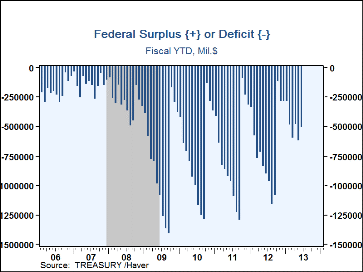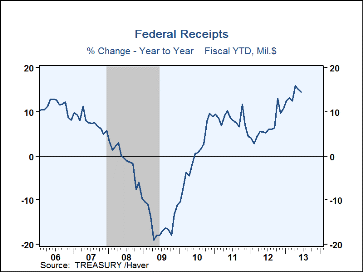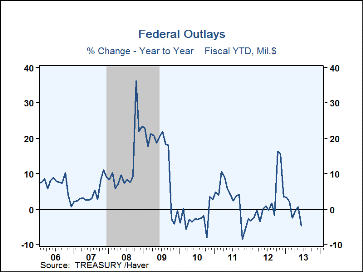 Global| Jul 11 2013
Global| Jul 11 2013U.S. Budget Surplus Emerges as Medicare and Defense Payments Decline
by:Tom Moeller
|in:Economy in Brief
Summary
The Federal Government ran a $116.5B budget surplus during June of FY'13. During June of last year, the government ran a $59.7B deficit. The 2013 figure compared to consensus expectations for a $40.0B surplus. So far this fiscal year [...]
 The Federal Government ran a $116.5B budget surplus during June of
FY'13. During June of last year, the government ran a $59.7B deficit. The
2013 figure compared to consensus expectations for a $40.0B surplus. So
far this fiscal year the deficit totaled $509.8B, nearly half the $904.2B
during the first nine months of FY'12.
The Federal Government ran a $116.5B budget surplus during June of
FY'13. During June of last year, the government ran a $59.7B deficit. The
2013 figure compared to consensus expectations for a $40.0B surplus. So
far this fiscal year the deficit totaled $509.8B, nearly half the $904.2B
during the first nine months of FY'12.
Driving the improvement in June's budget balance was a 49.4% m/m decline in net outlays. Year-to-date outlays thus fell 4.8% versus 2012. Behind these declines was a nearly two-thirds m/m drop in Medicare spending that left YTD spending up a minimal 1.5% versus last year. National defense spending also dropped nearly one-quarter m/m pulling year-to-date outlays 6.6% below last year. The improved economy dropped YTD income security payments 2.2% below last year. Also to the downside were net interest payments by 3.9%. A 5.3% YTD increase in social security outlays as well as a 2.6% rise in health spending countered these declines. In addition, veterans benefits gained 6.8%.
An improved economy raised revenues a strong 14.4% so far this fiscal year versus last. That reflected an 18.0% y/y gain in individual income taxes and a 16.9% y/y rise in corporate income tax payments. Social insurance receipts jumped an accelerated 11.2% y/y while excise taxes grew 6.6% y/y.
Haver's basic data on Federal Government outlays and receipts, and summary presentations of the Budget from both OMB and CBO are contained in USECON. Considerable detail is given in the separate GOVFIN database.
Debt Overhang: Why Recovery from a Financial Crisis Can Be Slow from the Federal Reserve Bank of Philadelphia is available here.
| US Government Finance | June | FY'12 | FY'11 | FY'10 | FY'09 | |
|---|---|---|---|---|---|---|
| Budget Balance | -- | $116.5B | $-1,089B | $-1,298.7B | $-1,294.2B | $-1,415.7B |
| As a percent of GDP | -- | -- | 7.0 | 8.6 | 8.0 | 9.5 |
| % of Total | YTD FY'13 | |||||
| Net Revenues (Y/Y % Change) | 100 | 14.4% | 6.4% | 6.5% | 2.7% | -16.6% |
| Individual Income Taxes | 47 | 18.0 | 3.7 | 21.5 | -1.8 | -20.1 |
| Corporate Income Taxes | 8 | 16.9 | 33.8 | -5.4 | 38.5 | -54.6 |
| Social Insurance Taxes | 36 | 11.2 | 3.2 | -5.3 | -2.9 | -1.0 |
| Excise Taxes | 3 | 6.6 | 9.2 | 8.2 | 7.1 | -7.2 |
| Net Outlays (Y/Y % Change) | 100 | -4.8 | -1.7 | 4.1 | -1.8 | 18.2 |
| National Defense | 20 | -6.6 | -3.6 | 1.7 | 4.6 | 7.6 |
| Health | 10 | 2.6 | -7.0 | 1.0 | 10.4 | 19.1 |
| Medicare | 20 | 1.5 | -2.8 | 7.5 | 5.0 | 10.1 |
| Income Security | 17 | -2.2 | -9.2 | -4.1 | 16.7 | 24.9 |
| Social Security | 20 | 5.3 | 5.8 | 3.4 | 3.5 | 10.7 |
| Veterans Benefits | 4 | 6.8 | -2.0 | 17.3 | 13.6 | 12.7 |
| Interest | 6 | -3.9 | -2.1 | 15.8 | 2.9 | -24.6 |
Tom Moeller
AuthorMore in Author Profile »Prior to joining Haver Analytics in 2000, Mr. Moeller worked as the Economist at Chancellor Capital Management from 1985 to 1999. There, he developed comprehensive economic forecasts and interpreted economic data for equity and fixed income portfolio managers. Also at Chancellor, Mr. Moeller worked as an equity analyst and was responsible for researching and rating companies in the economically sensitive automobile and housing industries for investment in Chancellor’s equity portfolio. Prior to joining Chancellor, Mr. Moeller was an Economist at Citibank from 1979 to 1984. He also analyzed pricing behavior in the metals industry for the Council on Wage and Price Stability in Washington, D.C. In 1999, Mr. Moeller received the award for most accurate forecast from the Forecasters' Club of New York. From 1990 to 1992 he was President of the New York Association for Business Economists. Mr. Moeller earned an M.B.A. in Finance from Fordham University, where he graduated in 1987. He holds a Bachelor of Arts in Economics from George Washington University.
More Economy in Brief
 Global| Feb 05 2026
Global| Feb 05 2026Charts of the Week: Balanced Policy, Resilient Data and AI Narratives
by:Andrew Cates








